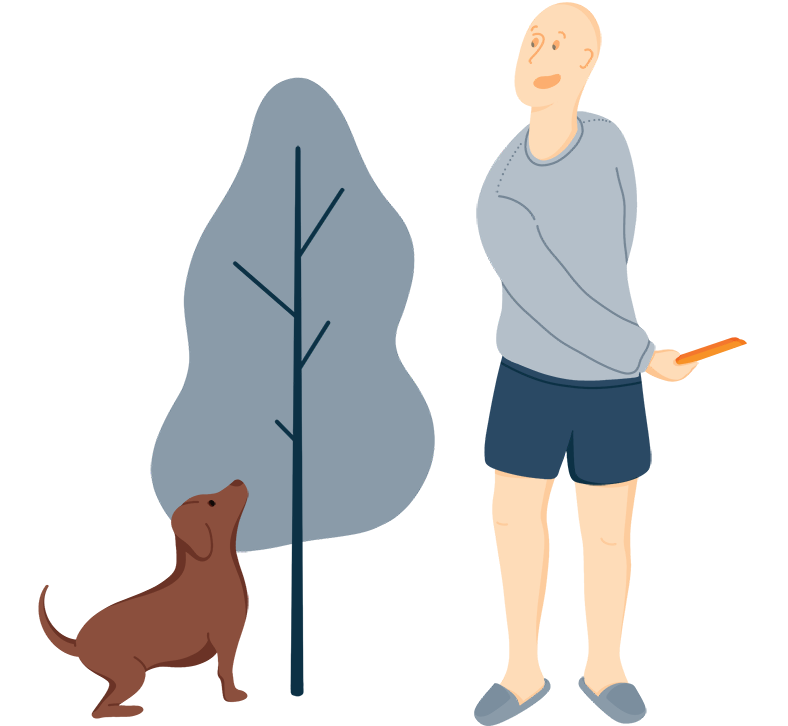What if I’m trying to crate train my puppy?

We covered earlier that puppies can experience nighttime anxiety after becoming newly separated from their mom and siblings. Many new pet parents will also try to crate train[8] their puppy during this time. Veterinary experts recommend several options to help a puppy sleep through the night while crate training.
The first is to try out a crate cover during summer when the sun sets later and rises earlier. Like humans, puppy sleep patterns can be affected by light and dark. Furthermore, the experts advise turning off additional lights in the room, such as televisions and cell phones.
They also suggest other ways to help the puppy feel secure and cozy inside the crate, such as a dog bed, blanket, soothing scents and sounds, and stuffed toys to cuddle with while they sleep. Pre-bedtime bathroom breaks are also important, but make sure it is relaxed and not an opportunity to play because this could wind them up before bed.
Lastly, be mindful not to feed your puppy too late or early. If puppies eat too early, they could become hungry during the night, and if they eat too late, they may need to relieve themselves in the middle of the night.
Check Out Our Guide: Best Rated Dog Crate Beds
PainAlso, like their human counterparts, pain can prevent dogs from sleeping through the night. Although they can’t describe their pain by speaking, dogs may try to share that they are in discomfort through various
Dogs of all ages could experience pain due to medical issues, general wear and tear, or an injury. However, an older dog is at an increased risk for health complications or chronic pain. If you suspect your dog is in pain, you should consult with a veterinarian immediately.
Some of the more common injuries a dog could experience include ingesting foreign objects, scratches and scrapes, eye injuries, and ligament tears.
Whether they are elective or a medical emergency, dogs can also experience discomfort following surgery. Many dogs will inherently want to lick or bite at their post-surgery wounds, which is why you will usually see dogs wear special collars to prevent them from doing this.
Dogs are also vulnerable to dental problems, such as Gingivitis and Periodontitis, that could become uncomfortable.
Canines can also develop osteoarthritis[5] that causes inflammation and pain in the joints. A veterinarian will be able to formally diagnose if a dog has arthritis.
Experts say there is not one specific reason why a dog develops this condition. Instead, they can develop osteoarthritis over time based on a variety of factors such as their build, being overweight, abnormal joint development, how active they are, previous injuries, orthopedic surgeries, and nutrition.
Unfortunately, dogs may also develop cancer during their lifetime. According to the U.S. Food and Drug Administration (FDA[7]), over half of pet deaths over the age of 10 are due to cancer.
However, the good news is that preventive care, emerging treatment reserach, and early diagnosis can help pets live longer.
Experts say pet owners should be mindful of certain warning signs that a pet may have cancer. Look for lumps or bumps, wounds that do not heal, swelling, and abnormal bleeding. Additionally, changes in how they eat, sleep, drink, and go to the bathroom could also be cause for concern.
As mentioned, our furry companions experience an increased risk of health complications as they age. One of those issues is Canine Cognitive Dysfunction (CCD), a behavioral syndrome affecting senior dogs. Several cognitive dysfunction symptoms could explain why an older dog might be restless at night.
The first is changes to their sleep-wake cycle. For example, the dog may become more fidgety at night when they’re supposed to sleep, or they begin to sleep more during the day instead. Dogs may also display repetitive behaviors such as pacing and an overall increase in anxiety and restlessness.

Many dogs can develop a lot of pent-up energy, and when they do not get enough exercise during the day, this could cause them to become restless at night. So while a walk or two around the block to go to the bathroom is some activity, it likely may not be enough to expel their energy, particularly if the dog is larger.
Why is my dog anxious at night?
There are many reasons your dog may be experiencing anxiety at night. Some of the reasons are medical, which only a vet could diagnose. Here are some common reasons your dog may be anxious at night:
If your young puppy is howling and unsettled at night, this is perfectly normal behavior! They are adjusting to their new environment, as well as missing their mum and littermates. They also have smaller bladders and may need to toilet a few times through the night.
On the flip side, elderly dogs may start to show signs of anxiety at night. This can be due to pain, or they may be experiencing cognitive dysfunction (senility).
You probably know yourself: any pain or discomfort usually seems worse at night. Without distractions or company, the pain feels more intense. So night-time anxiety can actually be a sign of discomfort. Examples would include arthritis, digestive issues or toothache.
You may be surprised to learn that separation anxiety can be an issue even when you’re at home! Some dogs with separation anxiety may feel anxious if you’re in a different room and they can’t get to you, like when you head off to bed.
Dogs have more acute senses than us. If your dog’s anxiety at night is intermittent, they may be upset by something outside. This could be as simple as a cat or fox visiting the garden, or it may be that they hear a helicopter overhead. Some dogs can sense thunderstorms, and many dogs have intense phobias of storms.
Dogs need both physical and mental exercise throughout the day. If they aren’t receiving enough of either, then they may struggle to settle at night. They may simply not be tired, or they may be bored.
10 SIGNS of STRESS in DOGS How to Help With Anxiety
Eleven-year-old Tate, a German shepherd, has started to have anxiety attacks, usually at night, says her owner Sharon Nevins of Berne, New York. When they occur she pants, shakes, and is unable to settle down. It happened twice last winter and then three times in November. It takes three to four hours before they pass. Tate has been seen by her vet, who performed blood tests. But she seems okay. Her thyroid test came back on the low side of normal, and the rest of her tests were normal. Why can’t Ms. Nevins calm her down?
Tufts Animal Behavior Clinic Director Nicholas Dodman, BVMS, DVA, DACVA, DACVB, says there are essentially four reasons for nocturnal anxiety.
1. A medical condition, often cancer (which cannot be diagnosed with a blood test), causes discomfort or even frank pain. “It seems that at night, when there’s nothing going on — just the ticking of the clock — there’s nothing to distract an animal from the pain and discomfort she’s going through,” Dr. Dodman comments. It’s true for people as well as dogs. There’s even a handout for the parents of young ones with cancer at Children’s Hospital in Boston, Dr. Dodman says, that tells mothers and fathers to be aware of the fact that their child may have a huge increase in anxiety at night.”
Dr. Dodman recalls one case of his own in which a dog was treated with painkillers and anti-anxiety medications for pain and anxiety it appeared to feel, mostly at night. The reason for any pain the dog might have been experiencing was unknown. But then one day, when the dog was walking, a bone in his leg broke. It turned out the dog had multiple myeloma, and his bones were hurting before a clinician could pick up on it. In another case of nighttime panic, the dog also seemed upset but for no apparent reason. Then, some months later, his eye started to bulge out. It turned out he had a tumor growing there. Once it was removed, the nighttime anxiety went away.
“There are lots of medical conditions that fly under the diagnostic radar,” Dr. Dodman says. The dog knows before the vet does, and it can cause her to be particularly anxious at night.” But he isn’t convinced a serious medical condition is what’s keeping Tate up at night. Keep reading.
2. Post Traumatic Stress Disorder Post Traumatic Stress Disorder can precede unpleasant nocturnal experiences. “If there is a history of trauma,” Dr. Dodman says, “it can come to be accompanied by awful dreams and disturbed sleep.” He recalls one dog who was shot accidentally by a Boston policeman and then entered nighttime states of agitation and panic. “The dog’s owner and his adult son did not get a full night’s sleep for two years,” Dr. Dodman recounts. They each took turns keeping the dog company throughout the night to help keep him calm.
Since Ms. Nevins didn’t mention PTSD as part of Tate’s history, Dr. Dodman has his doubts that that’s the culprit.
3.Alzheimer’s disease may result in nighttime anxiety. In people with Alzheimer’s, nighttime agitation is called Sundowner’s syndrome. At night they pace continually and cannot settle down. The same thing can happen with dogs who have the disease, which for them is called canine cognitive disorder. To assess whether 11-year-old Tate could have canine cognitive disorder, Ms. Nevins would want to go through a checklist, considering whether she has been experiencing disorientation, changes in interactions with people and other dogs, sleep-wake cycle alterations (check), and house-soiling. One of these signs isn’t enough to make a diagnosis. You really need to see a constellation of symptoms for a vet to be able to diagnose canine dementia. That constellation doesn’t seem to be there.
4. Nighttime noise phobia can trigger the unhappy nocturnal state. “I had one patient who was freaking out most nights in the winter,” Dr. Dodman recalls. “He would pace, pant, and salivate. He was truly in a terrible state. I asked his family to put on a tape recorder at night to see if any noises preceded the panic attacks. It turned out the culprit was the crew of snow plows going up and down the road. To the dog, those plows going up the street, turning around, and coming back, sparks flying, were like fire-breathing dragons.” He was scared to death.
Another dog reacted to a change in a household heating system. “Whenever the new system came on, it made a clunk. The dog thought the ‘scary’ noise from the cellar was a ghost or something.”
Dr. Dodman suspects nighttime noise phobia having to do with colder weather may be what’s going on with Tate since his owner specifies that it happened last winter and didn’t start to happen again until November. (It gets cold in Berne, New York, starting in the fall; the town is as far north as New England.) “I would explore that potential first before going after more complicated reasons,” he advises Ms. Nevins, “especially since German shepherds are prone to develop fears and are known for a number of different anxiety conditions. The dog’s borderline low thyroid values could be a factor that’s tipping the pet in the direction of being more sensitive,” he adds. “It can cause anxiety in people, and in dogs as well. In some cases, if you correct the thyroid condition, you eliminate the problem.
“But one should also insulate the dog from the noise that disturbs her,” he says. “Use white noise or some other device to distract her.”